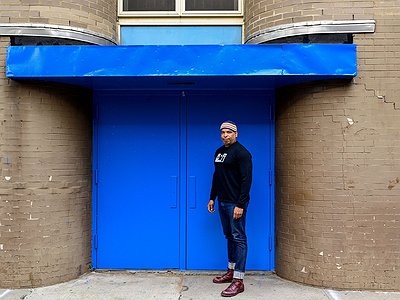Part 2
Let's say you have a gig coming up tonight. What does your approach look like – from selecting the material and preparing for, opening and then building a set?
First and foremost, I always do my research so to prepare for the type of gig that I will be playing for. Although I am labelled as a house music DJ, my strengths truly lie in playing different genres of electronic and acoustic music, which in away allows me to expand my sets to higher frequencies, as well as touch on atypical tones; and so, it is crucial that I have at my disposal a wide range of jams to choose from and, with a good portion on vinyl records, even wider and deeper.
I must also say proudly that there has never been a time where I arrive to a gig with the same order of music that I used on any one of my previous gig, and, I never plan my set’s beforehand. How I approach these things is always with a desire to do my best in making folks happy, all the while continuing to challenge myself while keeping things interesting for me personally.
Can you describe your state of mind during a DJ set? What supports this ideal state of mind and what are distractions? Are there strategies to enter into this state more easily?
I devote a good portion of time testing and figuring out the audience that’s in front of me waiting to be served. Honestly, it takes me at least an hour, sometimes more, to warm up, which is one of the reasons why I consider a two-hour set to be a joke. But I can also see why such a short playing time works for many of today DJ’s.
What are some of the considerations that go into deciding which track to play next? What makes two tracks a good fit? How far do you tend to plan ahead during a set?
Both as a DJ and with my being a music producer my aim is always to get to a point with my sets where I can tell a story. I devote most of my undivided attention to the audience.
But to answer your question directly: There’s a collaboration happening between myself and the audience. In the end, together we dictate where the party is going to end up. It’s all about a feeling and the energy that we create in the room.
Would you say you see DJing as improvisation? As composition in the moment? Or as something entirely different from these terms?
Playing music in front of an audience really should be all of those things all wrapped up into one and then some. But it seems as though far too many of us plan our sets beforehand or perform the same exact sets wherever we play out.
But I can’t really put the problem squarely on the DJ. Nowadays it doesn’t take much to please the masses who are generally content with attending some of the larger scale events with the sole purpose of taking selfies to show that they were in attendance. And so why work so hard if you’re not really required to?
I receive a lot of complaints from colleagues or folks with the right intentions who are constantly on me for not taking videos of my gigs. Obviously, it’s great for promoting myself. However, I can’t really bring myself to do it. For my goal is to bring it artistically and musically every time no matter what the situation turns out to be. Just never find the time to take a moment to do anything else once I’m deep in my element and groove.
How do playing music at home and presenting it in the club compare and relate? What can be achieved through them, respectively, and what do you personally draw from both?
Playing music at home grants me the freedom to listen and dance to whatever I want and at any given moment. Whereas when I’m playing in front of an audience - they have some influence over my selection process and decision making and I’m really Ok with that.
Good thing for me though is that I only carry music with me that I’m feeling, and so in the end I am allowing them to collaborate with me within the confines of music that I myself am digging, but I also know that they will as well.
How would you describe the relationship between your choices and goals as a DJ and the expectations, desires and feedback of the audience? How does this relationship manifest itself during a performance and how do you concretely tap into it?
I believe that I touched on this question a few times over. However, I do find it worth repeating.
My main goal is always to provide the audience with best music and dance experience possible while at the same time, trying to open them up to listening to other genres of music that they may have not be exposed to. The before mentioned can at times become challenging of course, but the rewards greatly outweigh the work that’s needed so to make sure that I’m making people as happy as humanly possible.
Seeing first-hand the smiles and appreciation on people’s faces makes whatever challenges that may occur all worth it in the end.
Especially thanks to the storage facilities of digital media, DJ sets could potentially go on forever. Other than closing time, what marks the end of a DJ performance for you? What are the most satisfying conclusions to a set?
Within the current trend of DJ culture and with two-hour max sets becoming the norm; these days there are many DJs who are uncomfortable with performing long sets. And so, in my opinion, unless they’re storing videos and photos, having more than 10gb of storage is a waste of HD space.
Speaking mostly, on my own behalf, the most satisfying conclusion to a night comes more so from the personal messages and emails that I receive from those who I touched. Till this day I receive many notes of gratitude from audience members who tell me how much I’ve helped them out of darker times in their lives or how my spirit deeply touched them. Because that’s what for me being a DJ s mostly about.
I am not exaggerating when I mention that I must be responsible for the coming together of at least one hundred married couples that I am aware of. Those are the indicators that convey to me that have I excelled with my overall agenda, which is ultimately to bring people together. Because as far as I’m concerned, there is no greater satisfaction than to be a part of making people happy and having the opportunity to use the most sacred of all arts to achieve it with.
Art can be a purpose in its own right, but it can also directly feed back into everyday life, take on a social and political role and lead to more engagement. Can you describe your approach to art and being an artist?
Growing up deeply immersed within music and art conditioned me very early on to live deeply within its universe. Just in the same way that I need air to breath and food to eat, I need music to sustain my well-being and keep me centred. I guess that would give some kind of explanation as to why I actually accepted the role of becoming a DJ/ Producer, because it wasn’t a conscious decision, nor was there a desire to even entertain being in the music business.
And to touch on it further, I’ve never fully embraced any of those roles. In truth, I again echo the truth, which is that I receive more satisfaction by simply listening and dancing to music more so than performing with it - all the while feeling blessed and so very grateful for the opportunities that music has afforded me.
Getting back to my thoughts that I previously touched on:
Music, Art and the Power that it has bestowed upon us, is in my opinion being misused and therefore to some degree is being wasted. I find it very difficult to put my faith in a society that seems to pretend to want positive change and yet continues to contribute to the opposite. The world is an even more confused and misguided place as in any time before, and because of it, far more of us are required to finally get it right, especially with this powerful weapon that we have on our side called music.
I’m looking forward to the day when we can all finally open our eyes and take notice to exactly what’s at stake, because we really need to figure it out. Because if one isn’t noticing our civil liberties and freedom are quickly becoming a thing of the past. As artists, we are positioned and surrender ourselves and our egos and take on the role of becoming a conduit. A loudspeaker if you will, that amplifies the voices of so many who do not have the platform or the means to be heard.
We need to somehow recognize and seize these golden opportunities that are afforded to us. Because there will come a time where it won’t matter how financially stable or popular for that matter we are - because we’ll simply become subjected to slavery.






